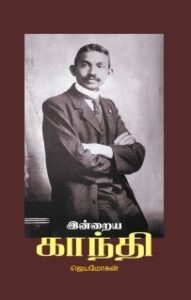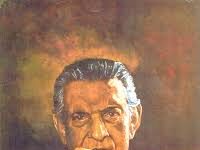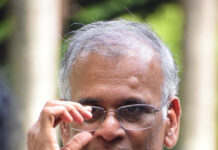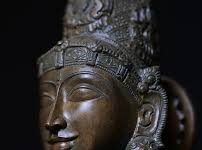
There was no planning behind this book and neither was there any research. This is an extensive conversation, a dialogue – a debate.
This all began by chance. The usual accusation, that Gandhi’s travel by third class incurred a higher expenditure, was thrown around by my friend, in an electronic conversation. I responded to this on my website in July of 2008 under the title ‘Expenditure on Gandhi’s Simplicity’.
This kindled a debate. Many friends and readers started expressing their doubts about Gandhi. To clarify, I replied in the form of essays, and the following debate had begun. Sometime later, while commenting on the Eelam issue, I wrote about the Gandhian ways. This sparked another row. As Eelam was a burning issue then, elaboration had not been possible. Questions emerged again, when I later wrote about Laurie Baker.
These doubts showed that a fervent interest in Gandhi still remained, and that, for the past fifty years, there have been planned and institutionalised attacks on Gandhi.
In the Christian school, where my daughter had studied, a teacher had taught the students that Gandhi had been a religious fanatic. “But you told me differently!” she had accused me. Many of our children study in schools that propagate such ideas. Many teachers have strong preconceived notions, which they infuse in the minds of children, irrespective of them being factually accurate.
Hatred toward Gandhi starts there, and at some point doubts surface. Gandhi touches people’s souls, with the truth that has a great inherent charm. When they get confused and put forth their doubts, arguments ensue.
I’m not addressing these doubts as an authentic Gandhian scholar or a researcher. I just present my arguments in the debate. There is plenty of research on Gandhi – we have Gandhian Universities and Gandhian Chairs in many universities in the country. There is no dearth of books. But they cannot satiate a common reader. Only the words of a writer, who seeks Gandhi with his soul, will serve the purpose.
This debate, in fact, gave me an opportunity to reflect on those questions. There was no need to delve deep into Gandhi in search of answers. I only tried to give a spontaneous response from my understanding of Gandhiism.
Like most, I too got to know Gandhi through his enemies. Communist Party and RSS were the strong political powers in my hometown. My image of Gandhi was inspired by their portrayal. Later, I was introduced to Gandhi in a whole new light through, M.Govindan, P.K.Balakrishnan, Sundara Ramasamy, Nitya Chaitanya Yati and the like.
For the last twenty years, I have been focusing on Gandhi and met many important Gandhians. I have written many articles on Gandhism, both in Malayalam and Tamil. I would identify myself as a writer, interested in Gandhism.
All these articles are based on my observation of Gandhian thoughts. I have made use of the notes taken from the books that I’ve read and the notes in my journal based on my reading. But, most of these are from my recollections and I award more credence to the facts that stay locked in memory. The internet was quite handy whenever I needed to verify my recalls. I also had ample help from quite a few friends personally. No distinctive research was done in the process of writing this book.
The reason for not categorising this book as a document of research is that, a uniform objective methodology – which is essential for research – has not been followed. No theoretical framework was planned that is essential for a research oriented book. Only my observations and impressions on Gandhian fervour are included in this book.
It was my intention to avoid the tone of inquiry. You will find that the language of this book is not that of a thesis. It is that of an author and hence emotional, based on metaphors. A thesis appeals only to a researcher. This book is meant for all seekers, and expects the reader to understand the issues with their conscience in a milieu that is familiar to them. So, I wanted this work to converse personally with the reader by touching their soul. The question-answer form, which it took naturally, helped the most in realising this.
I intended not to give importance to obscure trivia and I made it a point to exclude it. Most of the facts here can be found anywhere else. Hence, no attempt was made to cite the sources of information. The approach of this book is to deduce the historical picture that a common reader would paint with these facts.
I have referred to a host of books in this manuscript, but it’s apparent that they have not formed the bases for this debate. They have been mentioned only to indicate the path which led me to these thoughts and to facilitate any further inquiry for interested readers. These books are varied in nature, many of them contradicting one another.
The growth of Gandhian debates in Western countries is unprecedented. It is hard, even for a full time Gandhian researcher, to go deep into those books. Most of them are scholarly and theoretical in nature. They take forward their quest in varied socio-political and philosophical planes. Instead of examining and classifying them, it is ideal to try to understand Gandhi by applying one’s own intelligence, with the help of these books.
This book is not a critique on today’s Gandhian debates. As already stated, it is not based on research. It just tries to understand Gandhi with the help of information that is available, based on historical perception and general reasoning.
What is the contribution of this book? It tries to understand Gandhi and his doctrines, not from a narrow-minded separatist’s view, but in a broad historical perspective. Instead of evaluating Gandhi in relation to one political faction or theory, it evaluates Gandhi by placing him in the weft and warp of ideologies and historical possibilities.
I inherited this historical perspective from thinkers, whom I consider my mentors, M. Govindan being the pioneer. Thinkers from Kerala, like Anand and OV Vijayan, and Sundara Ramasamy are in fact, Govindan’s followers. This historical perspective is not achieved by manipulating history to fit our contemporary scenario. Rather, it takes us into the past, and gives us a timeless vantage, by delving into the antiquity, the need for which arises from our existing needs and beliefs.
The reader may realise that this book does not attempt to establish, defend, or try to protect Gandhi. It moves on, criticising and rejecting him wherever necessary. It tries to understand Gandhian struggle based on Gandhi’s idealism and vision. It tries to practically analyse, without exaggeration, the relevance of and the need for Gandhian vision today.
It is also evident that I have not tried to discard or weaken the forces against Gandhi. On the contrary, this book takes cognisance of their contribution to historical dialectics. History is a summation of hundreds of such contributions.
My contribution, as an author, is that I have formulated a vast historical background, and through the essays, have elaborated it logically. My linguistic skill has come in handy in this endeavour.
The meaning of anything, when viewed before a broader background and from a little distance, gets changed. Our prejudices and sentiments become meaningless. This book just tries to perceive Gandhi by placing him in his context.
I have been acquainted with Dr. V. Jeevanandam of Erode from 1992. He is a staunch Gandhian and has been the pioneer of many Green Movements in Tamil Nadu. The ideas put forth in this book were first presented at a Gandhian Seminar – organised by Dr. Jeevanandam in 1994 in the campus of his school – which has been brought out in his ‘Gandhi Souvenir’
In that article, I presented Gandhi as one who had been ahead of modernism. I portrayed him as one who – rejecting the strong grand structure of modernism and the triumph of science – had moved towards pluralism and the ethics-centred perspective of a tradition rooted in Indian soil.
Western scholars have dealt extensively with these ideas. Personally, after reading them for myself, my ideas expanded. The article of mine mentioned above served as the framework for the ideas presented in this book. I have discussed the subject of the article with Sundara Ramasamy and Ramachandran, a Gandhian scholar.
But my aim is not to create a notion of Gandhi or to analyse him in accordance with Eastern or Western thoughts. Such an approach would distance us from him. It should be our souls that strive to understand Gandhi.
Since I met Govindan in 1987, I have continuously been musing about Gandhiism and I feel that all of my ruminations have found their place in this book. This is merely a debate; I put forth my ideas in hope of inciting new thoughts that would defy or surpass mine and take me forward.
I dedicate this book to Erode V. Jeevanandam.
– Jeyamohan
(Preface of the Tamil book Gandhi Today)
Translated By Srinivasan












